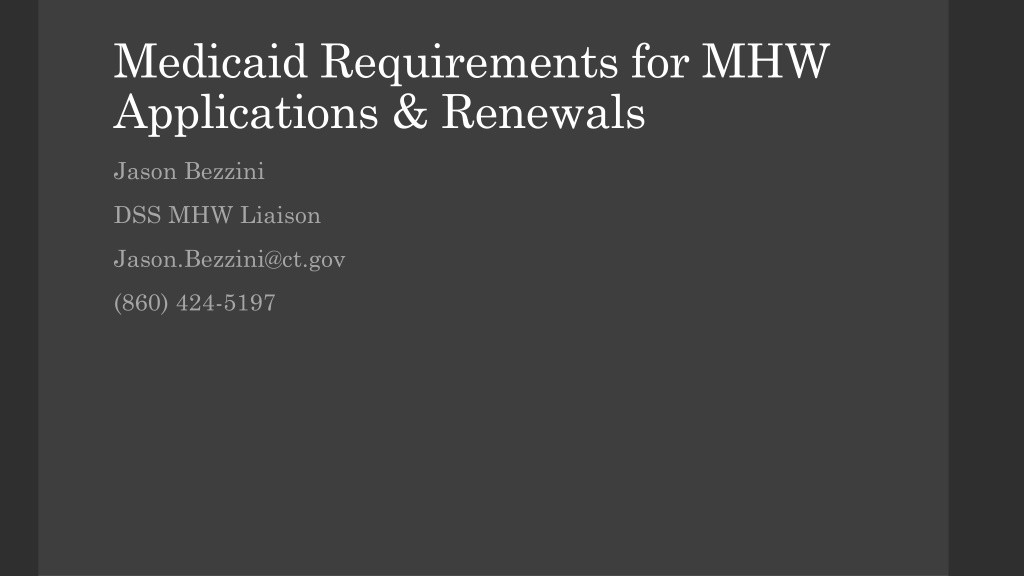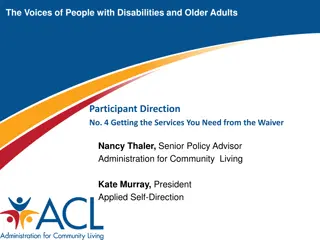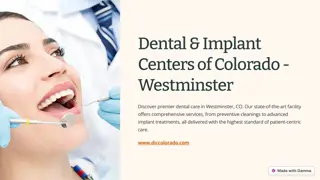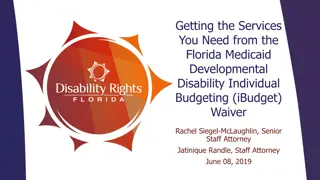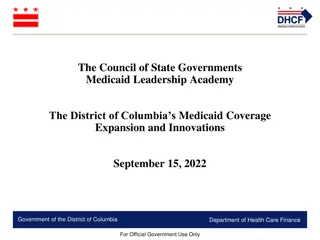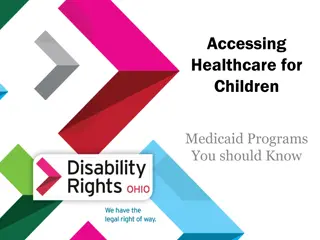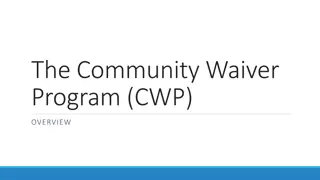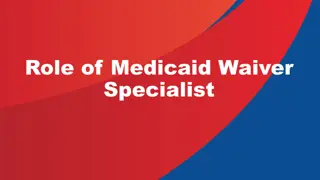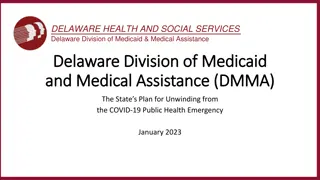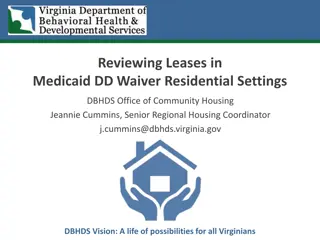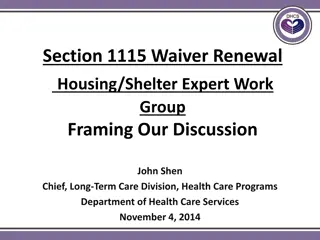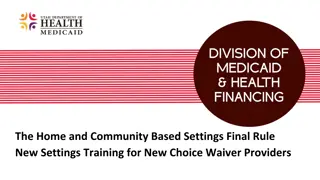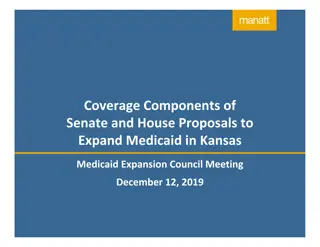Medicaid Requirements for Mental Health Waiver Applications & Renewals
Medicaid eligibility requirements for Mental Health Waiver (MHW) applications and renewals under Husky C, focusing on asset limits, income thresholds, citizenship criteria, disability determinations, and documentation needed for processing. Applicants must meet specific financial and medical criteria, including asset and income limits, citizenship status, residency in Connecticut, disability determination, and proof of marital status. Renewals necessitate regular financial reviews and updates on assets.
Download Presentation

Please find below an Image/Link to download the presentation.
The content on the website is provided AS IS for your information and personal use only. It may not be sold, licensed, or shared on other websites without obtaining consent from the author. Download presentation by click this link. If you encounter any issues during the download, it is possible that the publisher has removed the file from their server.
E N D
Presentation Transcript
Medicaid Requirements for MHW Applications & Renewals Jason Bezzini DSS MHW Liaison Jason.Bezzini@ct.gov (860) 424-5197
Medicaid Eligibility Requirements- Limits All items discussed are in regard to Husky C applications. Husky C applies to individuals who are either aged, blind, or have a disability. All individuals applying for the Mental Health Waiver will have to meet Husky C requirements. Asset limit of $1,600 under most circumstances. If the applicant is working and not married, the asset limit can increase to $10,000 under eligibility rules for Medicaid for Employees with Disabilities but the applicant may owe a cost share based upon their income. If the applicant is married, between the applicant and spouse they can have up to $139,000 ($1,600 for the applicant, $137,400 for the spouse) based upon a spousal assessment calculation. Income limit of $2,523/month (increasing as of 1/23)- if income exceeds this, applicant may pursue a pooled trust. Income limit can be raised to $75,000/year under eligibility rules for the Medicaid for Employees with Disabilities
Medicaid Eligibility Requirements (continued) Must be a US Citizen or an eligible non-citizen (legal permanent resident or a refugee/asylee under certain circumstances). If applicant is a non-citizen, they must reside in the US for at least 5 years before they are eligible for assistance. If a sponsor is involved, sponsor information will also be required. The applicant must be a resident of Connecticut and if initially living out of state, must provide proof of residency within 30 days of application. The applicant must be receiving some form of Social Security (typically SSI) or have applied for and have proof that they have applied for it and were denied and have appealed/are appealing the decision.
Medicaid Eligibility Requirements (continued) The applicant must have a disability determination- most often this is done through Social Security. If the applicant is receiving SSI / SSDI, that would meet this requirement If the applicant does not have a Social Security determined disability, a medical packet must be completed by the applicant & a medical provider attesting to the disability status, and a yearly update is required at renewal. All states have different Medicaid rules- if someone is active on Medicaid in another state, they still must be determined eligible in CT. Five year financial review of any and all assets- bank accounts, IRA s/investment accounts, stocks, bonds, trusts, life insurance policies, annuities, reverse mortgages, property, vehicles, funeral contracts. The five year review is typically the December statement only for the 3 outlying years (currently 2017, 2018, & 2019) along with the most recent 2 years worth of statements (currently 11/2020-present).
Medicaid Eligibility Requirements (continued) Proof of marital status- marriage certificate, divorce decree, death certificate of deceased spouse. We require hard proof verification of marital status- for example, if someone simply reports they were divorced 8 years ago, it is not sufficient. Proof of the gross amount of any income above and beyond Social Security (pension, annuity, rental income, alimony, employment, dividends, etc). A direct deposit into an account is not sufficient only shows a net benefit, and we require the gross benefit amount prior to any deductions for insurance or taxes. Veteran status, if any- applicant must pursue VA pension benefits if they are a veteran or the spouse of a deceased veteran. A final decision is not required, but hard proof (either copy of mailed response of receipt from the VA or screen shot/email confirmation of online application submission) is required.
Medicaid Eligibility Requirements (continued) More complex assets may require additional paperwork (annuity contracts, trust creation documentation/Schedule A, etc). If married, widowed, or divorced within the past 5 years, a financial review is required for the applicant s spouse as well, up to and including the date of divorce or date of death. If the applicant is widowed within the past 5 years, a copy of any probate documentation would be required showing how the spouse s assets were disbursed after their passing. Applicants must at least elect a statutory 1/3rd share of their deceased spouse s estate or they may be subject to a penalty period. If the applicant is separated from their spouse but not divorced, it can create additional complications as they are still legally liable for one another. The applicant may end up being denied if the separated spouse does not provide the requested information.
Medicaid Eligibility Requirements (continued) Verification of any private medical insurance (Anthem, United Healthcare, etc), along with copy of the card & completed medical insurance form W- 1685. Completed pages 11 & 12 of application form W-1LTC regarding transfers of assets. Completed page 16 of W1LTC or W1J form regarding annuities.
Not All Applicants Require a Financial Review Those who have been on SSI for 2 years or more do not require a review, as Social Security does an in-depth financial review for the 3 years prior to an SSI application, which is in line with Connecticut State Medicaid requirements. Those who have been on an asset tested type of Medicaid in Connecticut (Husky C) for 5 consecutive years or longer do not require a review. Marital status comes into play as well- if the applicant is married or happens to be divorced or widowed but has never provided hard proof of this status to DSS, they will require a review (sometimes partial, sometimes just the death certificate/divorce decree) even if the above criteria are met. Example- if the applicant was divorced two years before applying, we would require spousal assets up to and including the date of divorce.
New Applications If an applicant requires a new application, we keep the application open for at least 30 days. After 30 days, if the applicant has not provided any information, the application is denied for failure to provide verification timely. Failure to provide verification denials are the most common form of denial for DSS programs. An applicant needs to only provide DSS with one piece of verification by the 30th day in order to keep the case in a pending status. Even a single bank statement from a requested account would be sufficient. Once an item is provided, DSS has 10 days to review it and either determine eligibility (grant or deny the case) or submit an updated request form if additional items are still required. If the applicant is over either the income limit ($2,523/month as of 1/22) or asset limit ($1,600 in most cases) after 30 days, the case can be denied for exceeding the limits.
New Applications (continued) Cases can (and do) pend more than 30 days if the applicant has not proven to be ineligible (over asset/income limits) and continues to provide verification by the due date on the request form. Each time a new request form is sent, the applicant is given 11 days from the date the request is generated to provide at least one more of the additional items on the request. If a case is denied and if the referral remains open, in most cases it can be reopened once the applicant provides DSS with at least one of the items requested on the most recent request form. This applies in situations where the applicant has at least some active medical assistance or the Medicare Savings Program. Once reopened, the case will have a new application date and a fresh 30 days from that date to provide at least one piece of additional verification (if needed) to keep the case in a pending status.
Making a New Referral? Applications Help! When receiving new referrals, one of the most difficult components is determining the applicant s financial situation. Without a completed application (DSS Form W-1LTC), all that can be relied upon to create a request to an applicant is documents already on record with DSS and what may have been reported in the past. Some new applicants have little to no prior program history or have never been on an asset tested medical program (Husky C), so many items will be requested of the applicant that may or may not be applicable to their financial situation. Multiple documents that are included in the W-1LTC application are required to be completed as a condition of eligibility.
Benefits of an Application If an application is completed prior to receiving a new referral, many questions that typically are on the initial request form will be answered. The initial request form will be tailored specifically to the applicant, making the process and the request form more streamlined. This will result in less confusion on both the DSS and applicant side as to what is needed to determine eligibility. If the applicant has a representative assisting them, there is a place on the application form (Section D on pages 4 & 5) where they can provide authorization to disclose information, which can make for a smoother application process if the DSS worker knows who to contact from the beginning.
Benefits of an Application (continued) Less paperwork will have to be sent out to the applicant (pages 11 & 12 of W-1LTC [asset transfer requirement], page 16 of W-1LTC/ W-1J [annuity requirement], W-1685 [private medical insurance requirement], W-298 [authorized representative form]). All these documents are typically included in initial mailings, which may overwhelm new applicants and make them less likely to follow through with the application process. These additional forms are all contained in the W-1LTC application itself. Due to many of the questions being answered initially on the application, more focus can be put on what may be required/missing, which can lead to faster processing of the application and an earlier eligibility determination/start of service date.
Renewal Basics Renewals for any type of medical assistance (MHW included) are required on a yearly basis. Renewal forms are sent out approximately 6 weeks prior to their due date, so the applicant should receive the form mid-late month prior to due date. The applicant will need to inform DSS of any changes in their situation- new address, phone numbers, employment income, closed accounts, newly opened accounts, etc. In general, if there are no changes to report, a minimum of an updated bank statement is required. The asset limit for assistance is $1,600, so if the statements show the applicant has assets in excess of this figure, proof of spend down is needed. An exception exists for those who are working and have a disability- the asset limit for these individuals is $10,000. When calculating asset eligibility, we deduct income in the month received from the total assets. For example, if an applicant has $2,400 showing as their balance as of 11/5/22, but just received their Social Security Disability of $1,000 on 11/1/22, we will determine their countable assets to be $1,400, and the applicant would be found eligible.
Renewal Basics (continued) If the applicant s income exceeds $2,523/month (current amount, calculated off of 3 times the basic SSI amount, changes each January), they require a pooled trust with Plan of CT and likely would have already had to establish one prior to being found eligible. Not many individuals fit this category, but those who do need to provide updated pooled trust documentation showing they are still contributing/how much they are contributing to the trust monthly. DSS does have a relatively new Asset Verification System (AVS) which was launched back in late 2019, but this system can and does from time to time miss accounts. This sometimes happens due to something as simple as a middle initial being added when the applicant opened the account. This can cause AVS to not deliver results as it must be an exact match to what we have on file for the consumer s name. If the only income is Social Security, and the only reported accounts can be verified through AVS as being under the asset limit, the system may be able to passively renew the medical assistance without requiring the applicant to fill out renewal paperwork. This is a newer functionality in our system. This may cause some confusion as the applicant will not receive their renewal form if the system can complete the passive renewal. The applicant should however receive a notice of action advising that their program has been renewed.
Common Renewal Issues All cases are unique, but below are some of the most common items that hold up renewal completion: No bank statements being provided with the renewal and AVS cannot locate the account. The applicant closed an account within the past year but does not provide proof of account closure- very common in cases in which a new conservator takes over the applicant s finances. DSS records show an account for which no information is provided. There is no proof provided as to where the applicant s income is being deposited and records show no accounts.
Common Renewal Issues (continued) Transfers are noted to/from applicant s account from another account that DSS does not have proof of ownership of. Applicant has a bank account balance over the $1,600 program asset eligibility limit. AVS may find unreported accounts that may add to the total assets as well. Monthly deductions are allowed for income in month received. Applicant has life insurance with a cash value component that places them over the program asset eligibility limit of $1,600 or has a policy but does not provide updated paperwork showing the current cash value. Applicant has a source of income aside from Social Security (pension, employment, annuity, etc) and no proof of current amount is provided. Renewal is not signed. Renewal is not submitted.
Renewal Closures Renewals are always due by the end of a calendar month. If the renewal is not received timely, the system will close the applicant for failure to submit the renewal form typically by the last business day of the month. Unlike new applications, applicants are only sent one request form for missing information for renewals, and only have 10 days to return the information (30 days to spend down and provide proof if over the asset limit). If they only provide some (or none) of the requested information, the case will be closed out at the end of the month. Reinstatements can typically take place up to 90 days from closure, so long as the individual continues to have an open referral. To be fully reinstated, the applicant would need to provide the completed renewal form (if they have not already), along with proof of any changes, updated bank statements showing that they are still asset eligible, etc.
Any Questions? Feel free to reach out with any questions that may not be addressed today or that you may need more clarity on. If I do not happen to know the answer, I can find it for you and get back to you. If anyone would like copies of any resources (W-1LTC application form, W- 298 authorization form, or any other DSS document), please let me know. I can send these out to all staff if provided with a list, or individually upon request.
